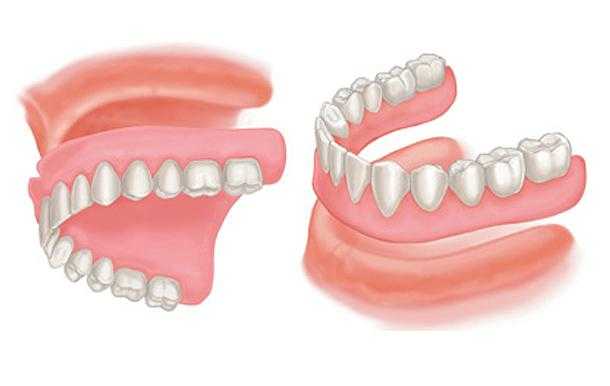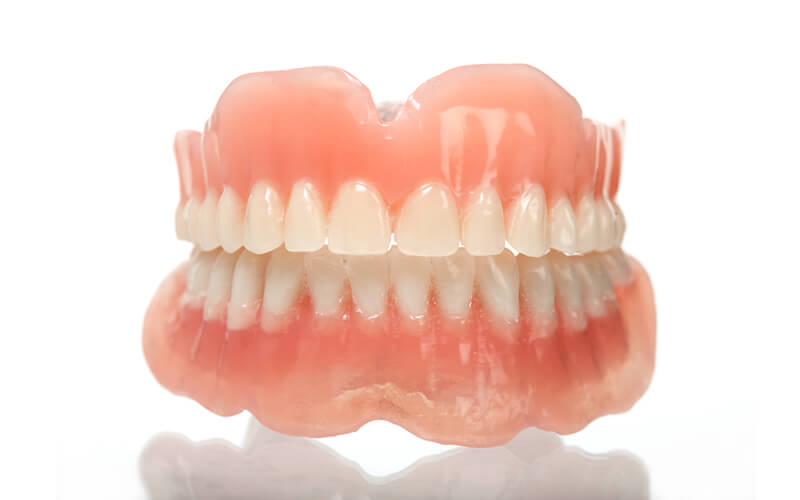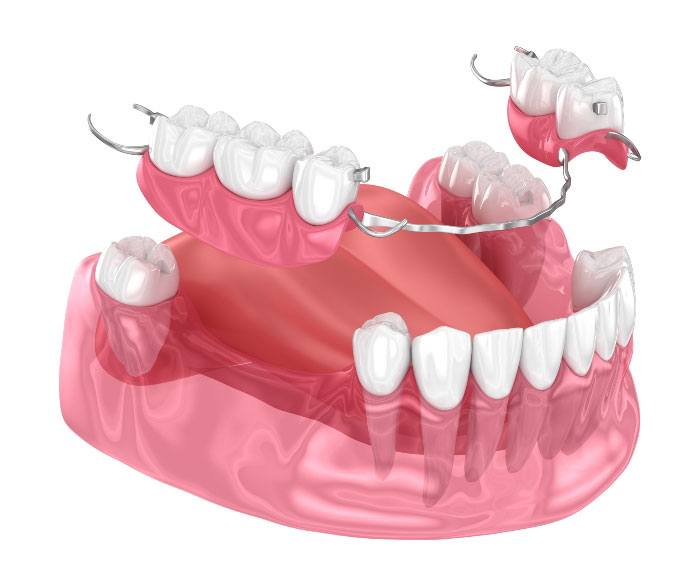

Complete dentures are used when there are no teeth remaining in one or both jaws. Removable partial dentures are used when some teeth remain in one or both jaws.
A ‘complete’ or ‘full’ denture is one that replaces all the natural teeth in either the upper or lower jaw or both. A complete denture is a removable acrylic replacement for teeth and bone lost in an entire dental arch. Replacing lost or missing teeth is very good for your health and appearance. A complete or full denture replaces your natural teeth and gives support to your cheeks and lips. Without this support, sagging facial muscles can make a person look older and they will find it harder to eat and speak properly.
Complete dentures are relatively economical, easy to fabricate and repair. They provide a level of esthetics and improve self confidence of patients by giving them a youthful appearance. Dentures help the patients to chew comfortably and speak properly.
Complete dentures are used when there are no teeth remaining in one or both jaws. Removr
Partial dentures replace teeth that are missing, and can sometimes be supported by the teeth you have left. If you have gaps between your teeth, then your other teeth may move to take up some of the space, so you could end up with crooked or tilted teeth. This could affect the way you bite and could damage your other teeth.
Sometimes, dentures can be given immediately after teeth extraction. These are called ‘immediate dentures’. With immediate dentures, you don’t have to be without teeth during healing stage. However, bone and gums can shrink over time, especially during the first six months of extraction thus immediate dentures may need relining, adjusting, or even replacement.
- Start with soft foods cut into small pieces. Chew slowly, using both sides of your mouth at the same time to balance the denture.
- Pronouncing certain words may take practice. Reading out loud and repeating difficult words will help.
- Occasionally denture may slip while laughing, coughing or on smiling, reposition them by gently biting down and swallowing.
- It is advisable to wear them for most of the time but take them out before going to bed. This allows your gums to rest and helps keep your mouth healthy. After removing dentures at night, it is best to store them in a small amount of water to stop them warping.
- Dentures are custom made to fit your mouth and you shouldn’t need a denture fixative. However, in some patients it is used initially to give them extra confidence.
- Even with full dentures, you still need to take good care of your mouth. Every morning and evening, brush your gums, tongue and the roof of your mouth with a soft brush.Dentures may break if you drop them. Always clean your dentures over a bowl of water or a folded towel in case you drop them.
- Dentures may need relining or rebasing because of normal wear or a change in the shape of bone and gum ridges as they can shrink with time. This may cause loosening of dentures which leads to discomfort and health problems including sores and infections. A loose or badly fitting denture can also make eating and talking more difficult. It is important to replace worn or badly fitting dentures before they cause problems.
Partial Denture:
This is a method to replace one or more teeth attached to a removable plate which may be all acrylic or a mixture of metal and acrylic. Both types may have clips (clasps) to help keep the denture in place. Depending on where they are, some of these clips may show on smiling or on wide opening of mouth.
Acrylic partial dentures are less expensive as compared to metal partial dentures. But unless they are designed very carefully they can damage the teeth they fit against.
Metal partial dentures are usually made from an alloy of cobalt and chromium, and they are much stronger. They are lighter to wear and can be supported by the remaining teeth. Although the base is metal, they have gum-coloured acrylic and natural-looking teeth fixed to them.

Get the Perfect Smile at Manju Dental Care